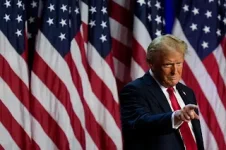Trump Halts US Aid to Zimbabwe, Puts $360 Million in Programs at Risk.
Former President Trump ordered a pause on US foreign aid yesterday. His order stopped aid payments for 90 days, which could affect many projects in Zimbabwe that receive US money.
The US gave Zimbabwe about $360 million in 2024, which helped pay for health care, food, and other important programs. Zimbabwe's government expected to receive $800 million from all foreign donors in 2025.
Trump said US aid programs don't match American interests. He wants to check if they follow US foreign policy. If programs pass this review, aid can start again before the 90-day period ends.
The US helped many people in Zimbabwe last year. It paid for HIV treatment, food security, and emergency help. The biggest program was HIV care, which got $182 million. Emergency aid received $60 million. Food programs got $37 million.
Zimbabwe's top aid official, Simon Masanga, said US money goes straight to groups that run these programs. His office plans to talk with USAid about what the pause means for current projects.
USAID runs many health programs in Zimbabwe. It helps fight HIV, TB, and malaria. It gives out mosquito nets and sprays for mosquitoes in 45 areas. The agency also assists mothers and children with health care.
The agency helps farmers grow more food. Since 2010, it has worked with 200,000 small farms. These farmers learned better farming methods and found new places to sell their crops.
USAID also supports good government practices and clean water projects. It helps young people get jobs and training. More than half of Zimbabwe's people are under 35 years old.
Former President Trump ordered a pause on US foreign aid yesterday. His order stopped aid payments for 90 days, which could affect many projects in Zimbabwe that receive US money.
The US gave Zimbabwe about $360 million in 2024, which helped pay for health care, food, and other important programs. Zimbabwe's government expected to receive $800 million from all foreign donors in 2025.
Trump said US aid programs don't match American interests. He wants to check if they follow US foreign policy. If programs pass this review, aid can start again before the 90-day period ends.
The US helped many people in Zimbabwe last year. It paid for HIV treatment, food security, and emergency help. The biggest program was HIV care, which got $182 million. Emergency aid received $60 million. Food programs got $37 million.
Zimbabwe's top aid official, Simon Masanga, said US money goes straight to groups that run these programs. His office plans to talk with USAid about what the pause means for current projects.
USAID runs many health programs in Zimbabwe. It helps fight HIV, TB, and malaria. It gives out mosquito nets and sprays for mosquitoes in 45 areas. The agency also assists mothers and children with health care.
The agency helps farmers grow more food. Since 2010, it has worked with 200,000 small farms. These farmers learned better farming methods and found new places to sell their crops.
USAID also supports good government practices and clean water projects. It helps young people get jobs and training. More than half of Zimbabwe's people are under 35 years old.












